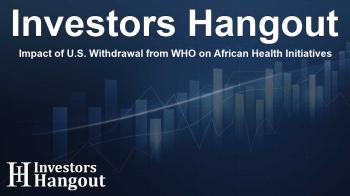Impact of U.S. Withdrawal from WHO on African Health Initiatives

U.S. Withdrawal from the WHO: A Concern for Africa
The ongoing discussions about the U.S. pulling out from the World Health Organization have sparked significant concerns among health officials across Africa. According to the Africa Centres for Disease Control and Prevention, this withdrawal could severely hinder ongoing health initiatives aimed at addressing pressing health challenges on the continent.
The Role of U.S. Funding
In the past, many African nations have depended heavily on U.S. investments through the WHO for essential public health programs. This support has been crucial in managing various health crises and fostering improvements within the healthcare landscape.
Ngashi Ngongo, a senior official at Africa CDC, emphasized the profound impact that the U.S. funding cut could have on health systems throughout Africa. He pointed out that the WHO has played a pivotal role in enhancing health service delivery across the continent.
Rethinking Health Financing Strategies
As the situation unfolds, health leaders are urging African countries to explore alternative sources of funding. There is a growing need for nations to reassess how they financially support their health sectors to mitigate the anticipated consequences of the U.S. withdrawal.
A notable reaction came from Zimbabwe's finance minister, who voiced concerns that the withdrawal might result in decreased health aid for countries grappling with severe health issues, particularly those impacted by HIV/AIDS.
Finding New Funding Opportunities
Ngongo mentioned that Africa CDC may have to seek collaborations with non-African countries as a way to counterbalance the expected decline in support from the WHO. This could involve establishing new partnerships or securing funding from international agencies focused on improving public health.
Despite the apprehension surrounding U.S. withdrawal, Ngongo remains cautiously optimistic about the potential resilience of Africa CDC. However, he noted that a joint action plan with the U.S. government that had been in development could now face uncertainty.
Looking Ahead
The implications of the U.S. exit from the WHO extend beyond immediate financial concerns; they might disrupt long-term health strategies that have been in place. African nations are now at a crossroads, where innovative financing mechanisms and proactive health policies will be crucial in ensuring sustainability and effectiveness of health programs in the face of such challenges.
Frequently Asked Questions
What is the main concern regarding the U.S. exit from the WHO?
The primary concern is the potential loss of funding for crucial health initiatives in Africa.
How have African countries relied on U.S. support?
Many African nations have depended on U.S. investments through the WHO to fund public health initiatives.
What is Africa CDC's response to the situation?
Africa CDC may seek alternative funding opportunities with non-African countries to compensate for the expected loss of support.
Why is Zimbabwe’s finance minister concerned?
The minister worries that the U.S. withdrawal could lead to cuts in health aid for countries severely affected by diseases like HIV/AIDS.
What long-term impacts could the U.S. exit have?
The exit may disrupt established health strategies and create uncertainty in ongoing health programs across the continent.
About The Author
Contact Kelly Martin privately here. Or send an email with ATTN: Kelly Martin as the subject to contact@investorshangout.com.
About Investors Hangout
Investors Hangout is a leading online stock forum for financial discussion and learning, offering a wide range of free tools and resources. It draws in traders of all levels, who exchange market knowledge, investigate trading tactics, and keep an eye on industry developments in real time. Featuring financial articles, stock message boards, quotes, charts, company profiles, and live news updates. Through cooperative learning and a wealth of informational resources, it helps users from novices creating their first portfolios to experts honing their techniques. Join Investors Hangout today: https://investorshangout.com/
The content of this article is based on factual, publicly available information and does not represent legal, financial, or investment advice. Investors Hangout does not offer financial advice, and the author is not a licensed financial advisor. Consult a qualified advisor before making any financial or investment decisions based on this article. This article should not be considered advice to purchase, sell, or hold any securities or other investments. If any of the material provided here is inaccurate, please contact us for corrections.

